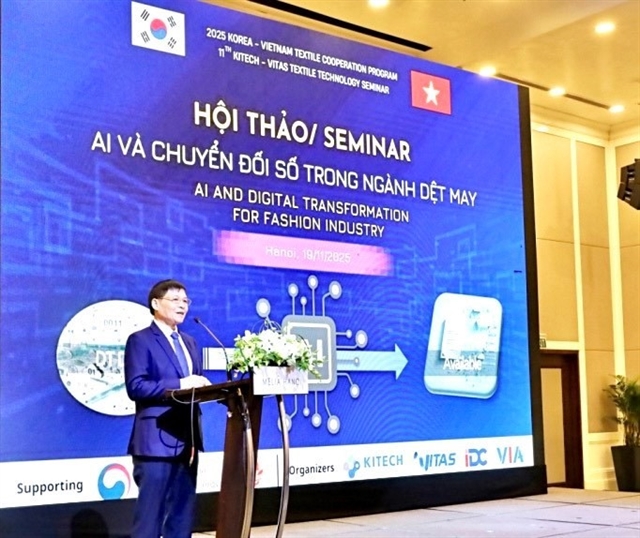HÀ NỘI ( WNAM MONITORING ): The Industrial Development Centre (IDC) under the Ministry of Industry and Trade, in collaboration with the Vietnam Textile and Apparel Association (VITAS) and the Korea Institute of Industrial Technology (KITECH), held an international workshop in Hà Nội , focusing on AI and digital transformation in the textile and garment industry.
IDC Director Chu Việt Cường underlined that automation is becoming an inevitable trend in the global garment industry. Technologies such as sewing robots, automated cutting systems, AI-powered line balancing and smart production lines are enabling Vietnamese manufacturers to boost productivity, reduce labour dependence, and enhance product quality and consistency.
He added that sustainable fashion supported by AI tools, including 3D design, product lifecycle management, traceability and data-driven production optimisation, is essential for meeting green, circular and low-emission standards.
Việt Nam’s textile industry now faces an urgent need to modernise technology, raise productivity and comply with increasingly rigorous environmental requirements amid fast-changing global markets. Access to advanced technologies and modern production models is therefore critical and aligns with Việt Nam’s green transition goals and international commitments. IDC, as the ministry’s technical support unit, affirmed it would continue assisting textile enterprises in technological renewal, digital transformation, expert connections and sustainable development.
VITAS Vice Chairman and Secretary-General Trương Văn Cẩm said textile enterprises must now carry out a dual transformation – digitalisation and greening, which has become essential rather than optional. Over the past decades, Việt Nam’s economy, including the textile sector, has grown strongly with significant foreign direct investment (FDI), in which the Republic of Korea remains one of the leading investors.
By the end of 2024, total FDI from Korean enterprises in Việt Nam is expected to reach around US$90 billion. In the textile sector alone, Korean investors have contributed nearly $6 billion to more than 1,000 active projects, accounting for one-fifth of the sector’s total FDI. These enterprises not only operate high-tech projects but also introduce solutions that enhance competitiveness and reduce costs.
Experts noted that while processes such as fabric inspection, cutting and packaging have achieved high levels of automation, sewing continues to lag behind. They outlined a roadmap that includes the use of AI-based vision systems (such as OSHIMA and Morpha AI) for fabric defect detection and KUKA robots for packaging. They emphasised that achieving success relies not only on investing in machinery but also on having a clear strategic direction and adapting hybrid systems to fit each factory’s unique conditions.
On sustainability, Cold-Pad-Batch (CPB) dyeing technology is emerging as a key solution for low-emission knit fabric production. This greener method is considered the future of textile dyeing and offers strong economic benefits. Data show that CPB can reduce utility costs for water, steam, electricity and salt by 72.8 per cent and cut emissions by 0.3359 kg of CO₂ per kilogramme of fabric compared with traditional dyeing processes.
Digital transformation and the adoption of AI/3D technologies are also reshaping the fashion industry. Digitalisation is the first essential step in turning data into digital assets, enabling the use of AI and Big Data. Integrating 3D and AI tools from platforms such as Adobe (Substance 3D, GenAI) and CLO Virtual Fashion significantly shortens product development cycles and increases efficiency and sustainability. Adobe technologies can create digital samples four times faster than physical ones, while CLO’s ecosystem with tools like AI Pattern Drafter and Auto Fitting Tool aims to replace up to 90 per cent of physical samples with 3D models.
According to Cẩm, digital transformation helps enterprises move faster, enhance competitiveness and improve product and process quality. Meanwhile, green transition is a prerequisite for long-term and sustainable development, as is complying with strict global standards. With 85% of Vietnam’s textile output exported, enterprises must meet international requirements on sustainability, labour standards and environmental management across the supply chain.
VITAS expects the workshop to generate practical cooperation opportunities between Vietnamese enterprises and international partners, especially those from the RoK.


